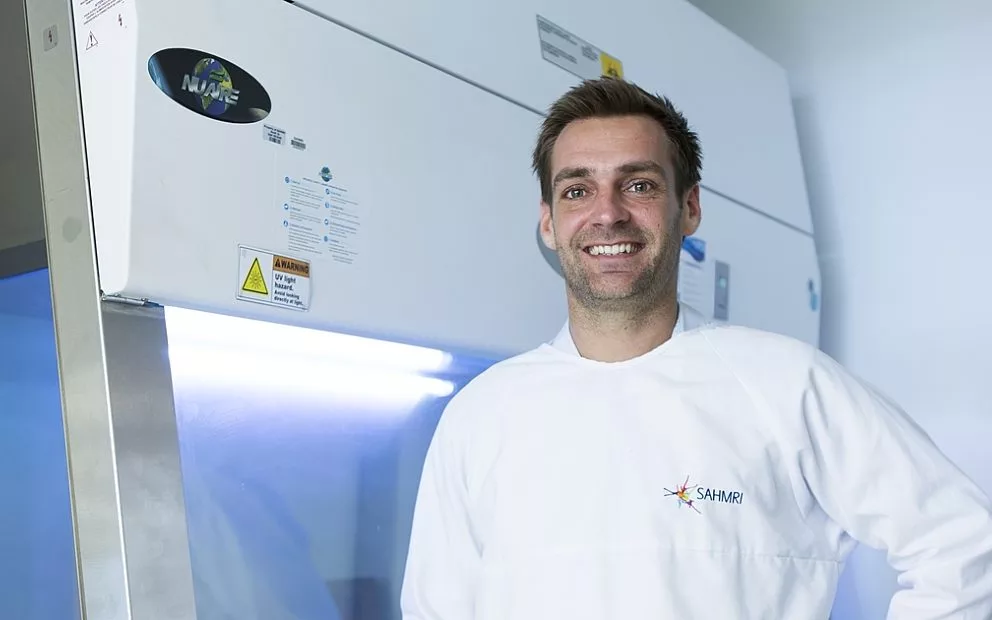Every day, 32 Australians are diagnosed with Parkinson’s disease. Despite the devastating effects of this disease, current treatments are sub-optimal or non-existent. With the support of Perpetual’s IMPACT Philanthropy program, research teams at the South Australian Health and Medical Research Institute (SAHMRI) will be trialing an innovative in vitro platform to study live brain cells (neurons) directly from Parkinson’s patients, rather than using classical animal models.
This new research strategy emerged from the recent Nobel Prize discovery that revealed a method to reprogram patient skin cells into stem cells.
Dr Cedric Bardy, Senior Research Fellow and leader of the Laboratory for Human Neurophysiology and Genetics within SAHMRI’s Lifelong Health theme, and Senior Lecturer at Flinders University, has been awarded funding from Perpetual IMPACT Philanthropy to undertake research to discover and validate new potential molecular targets to treat Parkinson’s disease.
The devastation that is Parkinson’s disease
There is no cure for this insidious disease. Dr Bardy said that current medication only helps to mask the symptoms of Parkinson’s temporarily.
“Therapeutics that will stop, or even slow, the debilitating progression of Parkinson’s are desperately needed and will improve the lives of millions of people,” Dr Bardy said.
Part of the problem is that access to live neurons from patients to study the disease and screen new drugs is very limited. To overcome this challenge, Dr Bardy and his team have designed a platform to generate live human neurons, and have used this approach to analyse the biological differences between neurons from healthy subjects and Parkinson’s patients.
Incredibly, the human neurons used in Dr Bardy’s research originally come from skin biopsies. To generate the brain tissue in a petri dish, the skin cells are transiently reprogrammed into stem cells based on state-of-the-art cell biology technologies. Dr Bardy’s research team at SAHMRI will use this new model to examine the biology of potential molecular targets to treat Parkinson’s disease.
Perpetual IMPACT Philanthropy; investing in a healthier future
Dr Bardy said that Perpetual IMPACT support will significantly strengthen pre-clinical research efforts that are necessary to lay solid foundations for future successful clinical trials.
“We have wasted too much energy and often created false hope in rushing through clinical trials that have failed. We need to rethink our strategy, and I believe developing better and more realistic human pre-clinical models is the key to increasing our chances of translational success,” Dr Bardy said.
“This work is critical in laying the foundations for screening new therapeutics that are needed to stop the debilitating progression of Parkinson’s. If successful for this Parkinson’s project, our approach may be extended to all kinds of brain disorders. Patient-derived neuronal models have the potential to truly revolutionise the way we do medical research.
“We are incredibly grateful to Perpetual for their generous support in helping us tackle debilitating brain disorders that affect so many people.”
Perpetual’s National Manager – Philanthropy, Ms Caitriona Fay, said that anything that can be done to assist the kind of research that can lead to new treatments and earlier diagnoses is a significant step.
“Perpetual actively works to enhance and expand the capacity of organisations and researchers to take bold new steps that open up new avenues of enquiry and new frontiers of treatment,” Ms Fay said.
SAHMRI’s Acting Executive Director, Professor Steve Nicholls, said that it is through support from groups like Perpetual that SAHMRI researchers are able to continue their ground breaking research.
“Our relationship with Perpetual is very important – they truly understand the value of health and medical research,” Professor Nicholls said.
“We are thrilled that they have agreed to support this important work.”.

